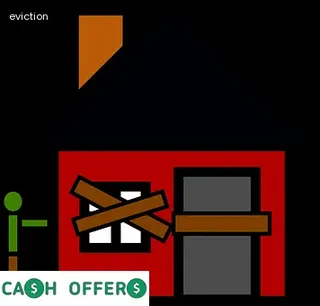Navigating the eviction process in Washington can be a complicated and time-consuming process for both landlords and tenants. It is important for both parties to have a thorough understanding of the laws regarding evictions, as well as all of the steps involved in this process.
A landlord must first provide a tenant with an appropriate notice and then file an eviction petition in court. The court will then set a hearing date, where the tenant has an opportunity to dispute the eviction complaint.
Following the hearing, if the court rules in favor of the landlord, they may be able to obtain a Writ of Restitution. This document authorizes law enforcement to remove a tenant from their rental property if they do not voluntarily vacate.
Landlords should also understand that there are certain restrictions on when evictions can occur, as well as what types of behavior can result in an eviction being filed against a tenant. Knowing these laws is essential for anyone looking to navigate the Washington eviction process successfully.

In Washington, there are several legal grounds for a landlord to evict a tenant. These grounds can be broadly categorized as non-payment of rent, violation of the rental agreement, and other legal reasons such as criminal activity on the property.
Non-payment of rent is the most common cause for eviction in Washington and requires that the landlord give the tenant an official notice before proceeding with an eviction. Other violations of the rental agreement such as allowing unauthorized occupants or pets on the property also require written notice from the landlord before filing for eviction.
Finally, landlords may be able to evict tenants if they have engaged in criminal activity on the property, which may include selling drugs or using illegal weapons. An understanding of these legal grounds is essential for navigating Washington's eviction process.
Illegal evictions in Washington are a serious issue that can have serious consequences. Tenants who are wrongfully evicted may be entitled to compensation, including damages for the costs of relocation and any harm suffered as a result of the illegal eviction.
In addition, landlords can face criminal charges and civil penalties if they are found to have violated the state's anti-eviction laws. Landlords may also be liable for violations of the tenant's privacy rights, as well as any damage to personal property caused by an illegal eviction.
Evictions must be conducted in accordance with Washington law; otherwise, tenants can pursue legal action against their landlord for violating their rights. It is important for renters and landlords alike to understand the eviction process in order to avoid potential consequences associated with illegal evictions in Washington.

When a landlord needs to file a complaint against a tenant in Washington, they should first review their rental agreement and the applicable laws in their jurisdiction. It is important for landlords to understand the eviction process and how to properly file a complaint against a tenant.
It is recommended that landlords consult with an experienced lawyer or legal professional prior to filing any sort of complaint. Landlords should know the specific grounds for eviction allowed under Washington law, such as failure to pay rent, violation of lease terms, or illegal activity on the property.
Furthermore, landlords should be aware of the various forms that need to be filled out and filed with the court in order to initiate an eviction proceeding. Additionally, it is important for landlords to understand their rights and responsibilities throughout the entire eviction process.
Serving tenants with notice to comply is an important step in the Washington eviction process. It is important to remember that the notice needs to be served to the tenant in a certain way and in compliance with Washington state law.
The best way to ensure that everything is done correctly is to hire a professional process server who is knowledgeable about the local laws and regulations. Notices can be served by hand, certified mail, or through another approved method.
In addition, it's important to document when and how you serve notice, as well as keep a record of all communications with your tenant regarding the notice. Following these guidelines will help ensure that you’ve taken all necessary steps for legal compliance throughout the eviction process.

When it comes to evicting a tenant from a property in Washington, there are certain steps that must be taken. Asking for possession from a tenant can be done in various ways, but it is important to be mindful of local laws and regulations when doing so.
The first strategy is to serve the tenant with an eviction notice. This document outlines the reasons for eviction, gives the tenant an opportunity to remedy any issues, and sets an end date for their tenancy.
Additionally, it is possible to ask the tenant directly or through a lawyer or third-party mediator if they would like to voluntarily surrender their rights to occupancy. If this fails, legal action may have to be taken which involves filing an unlawful detainer lawsuit in court and obtaining an order that requires the tenant leave the property.
Finally, if all else fails, landlords may have recourse in using self-help remedies such as changing locks or shutting off utilities.
Navigating the Washington eviction process can be difficult, but understanding the techniques for getting possession from a tenant is key. Depending on the reason for eviction, certain steps must be taken to ensure that all parties involved are legally protected.
Landlords should begin by filing an appropriate court document to initiate proceedings and providing written notice of the eviction. Once this is done, Washington tenants have 20 days to vacate or challenge the eviction in court.
If they choose not to do either, landlords may file a writ of restitution with the court clerk, which will allow them to receive possession of their property through law enforcement officers. To ensure a smooth transition out of the premises, landlords can provide tenants with moving assistance in exchange for their cooperation during the process.
In some cases, landlords may also require tenants to pay damages if they refuse to leave voluntarily. All in all, knowing these techniques can help landlords get possession from their tenants quickly and efficiently while still following Washington's laws.

Navigating the eviction process in Washington State can be an overwhelming and confusing endeavor. To ensure a smoother transition, it is important to familiarize yourself with the timeline of events involved.
First, the landlord must give notice to terminate tenancy. This notification can come in multiple forms depending on the situation such as a three-day notice or twenty-day notice.
Once that time period has elapsed, the landlord can then file an eviction lawsuit in court and serve the tenant with court papers. After that, the tenant typically has seven days to respond by filing an answer with the court.
If no answer is given, the landlord may request a default judgment which would allow them to regain possession of their property. The next step involves setting a hearing date if either party requests one where both sides will have an opportunity to present their case before a judge who will ultimately decide whether or not to grant an eviction order.
It is crucial to understand each step during this process so you are prepared for any eventuality.
When facing an eviction in the state of Washington, it is important to understand the evidence you must present in order to show cause for the eviction.
This evidence can vary depending on the type of eviction, as well as other factors, but it typically includes proof of lease violations, proof that all necessary legal forms have been completed and served correctly, and proof that all payment obligations have been met.
Additionally, you may need to provide proof that the landlord has fulfilled their own obligations under the lease agreement such as providing a safe and habitable living environment.
Ultimately, having this evidence prepared in advance can go a long way towards proving your case and avoiding an unnecessary eviction.

When you are faced with an eviction reason, it can be a stressful and overwhelming situation. It is important to know that there are alternatives to traditional eviction processes available in Washington State.
There are several options that can help tenants avoid the full court process of an eviction hearing and remain in their home or rental property. Tenants may be able to negotiate with their landlord for a repayment plan, a change in terms of lease agreement, or other options such as mediation services offered through local government agencies.
In some cases, landlords may agree to waive late fees or penalties if the tenant agrees to make payments on time going forward. Tenants should also be aware of any applicable laws or regulations that could impact the process such as security deposit limits, rent control laws, and other protections afforded by the state's landlord-tenant law.
Knowing your rights and understanding these alternatives can be helpful when facing an eviction reason in Washington State.
Navigating the Washington eviction process can be a difficult and time-consuming task. By exploring ways to speed up the timeline, landlords can quickly and efficiently remove tenants from their property.
One of the most important steps is to ensure that all paperwork is properly filled out and filed with the court in a timely manner; this includes filing both a summons and complaint form as well as any other documents required. Additionally, landlords should take advantage of local resources such as legal aid organizations or mediation services to better understand their rights and how to move forward with the process.
Careful consideration should also be given to how long each step of the eviction process will take—from serving notice to filing for a hearing—so that landlords are aware of what is expected of them throughout the entire process. Finally, understanding state laws regarding landlord-tenant rights can help landlords make sure they are acting within legal boundaries while also ensuring that their tenant’s rights are respected during this process.
By taking these proactive measures, landlords can effectively speed up the Washington eviction timeline while still adhering to all state regulations.

When navigating the Washington eviction process, it is important to understand how to provide evidence of an eviction. There are several methods available, each with its own pros and cons.
Gathering documentary evidence of the eviction notice can be a powerful tool in asserting one’s rights. This type of evidence is typically delivered via an official document that serves as proof of the landlord-tenant relationship and provides a clear timeline for the filing, service, and resolution of the dispute.
Other forms of evidence include witness statements or affidavits from third parties who have knowledge of the situation or circumstances surrounding the eviction. These documents are often more reliable than personal testimony alone because they can be corroborated by other sources.
Additionally, photographs, emails, and other types of physical evidence may also be useful in demonstrating an eviction occurred. Finally, while not necessarily required by law, recording conversations with landlords or property managers can provide helpful context if there is any dispute about what was discussed prior to or during the eviction process.
The creative solutions offered by DoorLoop's platform for Washington State residents looking to avoid eviction provide a variety of benefits. By signing up and accepting the terms and conditions, users gain insight into the impactful changes they can make in their lives.
Free downloads offer time saving tips and tricks that can make more money in the long run. Downloading documents from DoorLoop's platform is an efficient way to get organized and put your portfolio on track for success.
With access to request a demo, users can learn more about this technology which provides creative solutions to navigate the eviction process in Washington State.
Evicting a tenant in Washington State can be complicated, but it doesn't have to be. The eviction process differs from county to county and city to city, so it's important for landlords to understand the guidelines of their specific area.
It is critical that landlords follow all of the procedures laid out by state law, otherwise they may not legally evict a tenant. Landlords must serve tenants with written notice before taking any legal action; this notice must include the date and time the tenant must vacate the property.
If the tenant does not move out by that time, then a landlord can file an eviction lawsuit. In order to win an eviction case, landlords must prove that they had proper cause and legal justification for evicting their tenant.
If a landlord fails to prove their case, they will likely lose in court. Eviction proceedings also take time; depending on where you live in Washington State, it can take anywhere from 30 days to several months for an eviction case to be resolved in court.
Understanding all of these factors is key when navigating the Washington Eviction Process; however, with adequate knowledge and preparation, landlords can successfully navigate this complex process.

Yes, a 3 day eviction notice is legal in the state of Washington. In accordance with the Washington Residential Landlord-Tenant Act, a landlord can serve their tenant with a 3-day notice to vacate if they have failed to pay rent or have violated any other terms of their lease agreement.
The 3-day notice must be in writing and delivered either personally or by posting it on the tenant's front door. It must also include written information outlining why the tenant is being evicted and what actions they need to take in order to avoid removal from the residence.
If all requirements for a valid 3-day eviction notice are met and payment is not made within three days, then the landlord may proceed with filing an unlawful detainer action in court. This article serves as a comprehensive guide to navigating the Washington eviction process and understanding when a 3-day eviction notice is legally allowed.
Delaying an eviction in Washington State is possible, but navigating the process can be complex. Understanding the processes and timelines involved in eviction proceedings is essential for tenants hoping to successfully delay their eviction.
A tenant must have a valid legal reason for delaying an eviction, and should seek help from a lawyer or other legal aid if needed. In Washington State, tenants should be aware of the rules regarding notices, court hearings, and appeals.
If the landlord does not follow the proper procedures when filing for an eviction, then a tenant may be able to get their case dismissed. The tenant may also be able to delay the eviction by reaching an agreement with the landlord or filing a motion to stay in court.
Knowing how to navigate these options will give tenants more control over their fate when facing an eviction in Washington State.
In Washington State, tenants may be evicted for failing to comply with the lease agreement, not paying rent, creating a nuisance or conducting illegal activities on the rental property.
Landlords must have just cause to file for eviction and must provide written notice of termination before filing an unlawful detainer lawsuit in court.
The grounds for eviction are outlined in the state’s Residential Landlord-Tenant Act, which outlines the specific requirements that landlords must meet when evicting tenants.
Tenants can also be evicted if they damage the property beyond normal wear and tear, engage in a disturbance that interferes with other tenants’ peace and quiet, or fail to move out after their lease has expired.
In Washington State, the 20 day eviction notice is a notification that a tenant has broken their lease and must vacate the premises within 20 days. The landlord or property manager must provide written notification to the tenant in order for it to be legally binding.
This notice is also known as a “20 day pay or quit” notice, meaning that the tenant can either pay all past due rent or leave the premises within the given time frame. The landlord is not allowed to change locks, shut off utilities, remove tenants' property, or otherwise force them out without following these procedures.
It's important for tenants to understand their rights and responsibilities during this process so they can successfully navigate it and avoid any legal issues.
A: Generally, the landlord must provide the tenant with a 3-day notice to pay rent or vacate. If the tenant does not comply, the landlord can then file a lawsuit in court. The court proceedings typically take 2-3 weeks, but may vary depending on any delays or defenses raised by the tenant.
A: In Washington State, the Sheriff is usually able to serve an eviction notice via facsimile or fax machine within 24 hours of receiving the request. However, it can take up to three business days depending on the workload of the Sheriff's office.

A: The eviction process for a Plaintiff seeking Money Damages from a Property Management company in Washington State can take anywhere from two to four weeks, or even longer if Appellate review is necessary.
A: The eviction process for a tenant who has committed certain offenses, such as discrimination, can take up to 30 days from the date of service. If the tenant contests the eviction and goes to trial, the process may take longer depending on the complexity of the case. In accordance with Washington's Statute 59.12.030, landlords must give tenants a minimum of 20 days notice before filing with the court.
A: It typically takes 3-4 weeks for an eviction process to be completed in Washington State Superior Court if the tenant is being evicted for discriminatory reasons.

A: Generally, an eviction process for a month-to-month or periodic tenancy in Washington State can take anywhere from 30 to 45 days depending on the circumstances.
A: The length of an eviction process in Washington State typically takes from two weeks to two months. This timeframe can vary depending on the type of lease agreement, tenant's circumstances, and the complexity of the case. Costs and legal assistance expenses will also impact the overall timeline.
A: According to Washington State law, the eviction process can take up to two weeks if the tenant has been notified via registered mail. If the tenant does not respond within that time frame, the landlord may file a formal complaint with the court and begin the legal process.

A: Eviction processes in Washington vary depending on the specific circumstances and can take anywhere from one to three months. The landlord must first provide the tenant with an appropriate Notice to Vacate, and then file an unlawful detainer action with the Superior Court of Washington if the tenant fails to move out after the notice period has expired. After the court hearing, if the court rules in favor of the landlord, a writ of restitution will be issued giving the tenant 3-7 days to leave before law enforcement personnel are called in to remove them.
A: Depending on the circumstances, it can take a landlord up to 21 days from the date of eviction to reclaim their security deposit. This time period allows for the tenant to move out and for the landlord to inspect and itemize any deductions that may be taken from the security deposit.
A: In Washington State, the eviction process typically takes two to three months, depending on the specific circumstances of the case and any delays that occur. This includes serving the tenant with an Eviction Notice, filing a complaint in Superior Court, and obtaining a judgment from the court.
A: In Washington State, landlords are required to return the security deposit within 14 days of the court's judgment or the tenant's surrender of the rental property, whichever comes first.